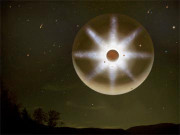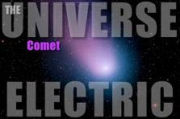|
|
The Numbers Game - From Cosmology to the Credit Crunch
by The Soupdragon
|
|
May 8, 2009
|
|
|
While many people are aware of the increasing role of
mathematical modeling in society in general, and science in
particular, very few have dared to question this situation.
The idea that mathematical models somehow reveal universal
truths, in both business and science, has been successfully
promoted, despite strong historical evidence to the contrary.
Let us examine some of the pitfalls of a purely mathematical
approach, in both historical and contemporary contexts.
A Road Less Travelled
Did science take a wrong turn?
|
|
|
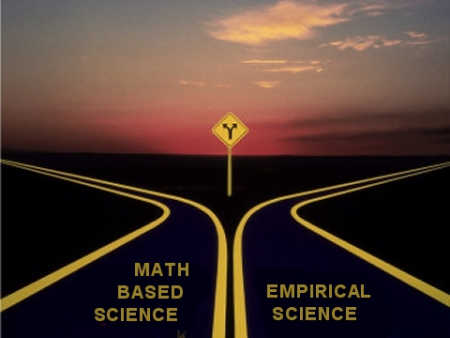
[Click to enlarge]
|
|
|
Science is synonymous with the philosophical discipline known
as empiricism, based on measurement and observation — or at
least it was. Because of the difficulty in measuring a lot of
the stuff out there, a degree of mathematical speculation
began to creep into astronomy. This was fine for a while, until
it began to spread like cancer, and took over. Today, astronomy
and cosmology are fields dominated by mathematicians, not empirical
scientists.
Although the mainstream seems happy with this situation, for
the most part, there is growing unrest in many quarters about
the uncritical acceptance of such a distorted approach to
science. Those who are ignorant of history are condemned to
repeat it, as the saying goes. There are, in fact, many
warnings from history about placing too heavy a reliance on
mathematics.
Ptolemaic epicycles are perhaps the most famous example of the
dangers of the mathematical approach. They were a series of orbits
within orbits designed to explain the motions of the planets, and
with a few tweaks they would still work today. However, despite
being mathematically correct - and indeed elegant - they failed
to reflect the underlying reality.
|
|
|
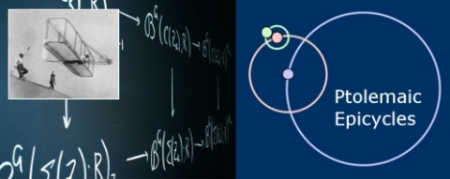
[Click to enlarge]
|
|
|
In another famous example, Scientific American ran an
article ridiculing the alleged flights of the Wright Brothers ...
some years after they had been flying successfully! This
pseudo-skepticism was based on the inertia of prior belief -
that heavier than air flight was not possible. Needless to say,
they had the math to prove that it was impossible, too.
Some people still react angrily to any criticism of the role of
mathematics in science, which is strange when you consider what
might seem to be an obvious, common sense notion: that mathematics
should be the 'servant' of science, not the 'queen'. Evidence
should always trump theoretical expectations, however highly
the theory might be regarded. Let's not put the cart before the
horse, in other words.
|
|
|

[Click to enlarge]
|
|
|
Philosophical issues lie at the heart of this problem. While the term
'proof' may be acceptable in a mathematical context, as in a
'mathematical proof', it is not appropriate, strictly speaking,
in a scientific context. The term 'scientific proof' is a misnomer,
in so far as scientific theories can never be conclusively verified,
only conclusively falsified. The term 'proof' implies 'a result that
is final and beyond doubt', whereas scientific theories, by definition,
should always be vulnerable to being replaced by new or improved theories.
Again, new math might be required. Mathematical proofs, therefore, do
not equate to scientific truths.
Furthermore, mathematical descriptions are often confused with
empirical explanations. For example, it is easy to overlook the
fact that we do not understand the mechanism behind gravity.
Newton admitted as much, and stated that he framed no hypothesis
in this regard. He had merely described it in mathematical terms,
but not what it was. In the hope of bringing gravity back down to
earth, so to speak, the search still goes on for a physical
mechanism. Gravity waves and/or graviton particles are the favored
speculations of the mainstream, although the particle responsible
for mass, the Higgs-Boson (or so-called God particle) still remains
elusive. (Gravity is often described as a property of mass.)
Famously, billions of dollars have recently been thrown at
the LHC (Large Hadron Collider) in Switzerland, in the vain
hope of pinning down this mystical beast. So far without any luck.
Einstein was quite simply contemptuous of experiment, preferring
to put his faith in pure thought.
- Paul Davies.
Einstein further muddied the waters when he replaced a mathematical
description of gravity with an abstract mathematical
description, by factoring in time as a physical dimension - the
fourth dimension. Few, however, now dare to question this scientific
scripture, but can empty space really be curved?
To the extent that the laws of mathematics refer to reality, they
are not true; and to the extent that they are true, they do not
refer to reality.
- Albert Einstein.
Even if you think Einstein had his tongue firmly planted in his
cheek when he said this, one has to admit that many a true word
is spoken in jest.
The black hole is another famous example of a mathematical
abstraction. Although based purely on theoretical assumptions,
their existence is now regarded as fact in mainstream science.
Because gravity is a near infinitely weak force, division by
zero (a schoolboy error, no less!) results in the famous 'point'
with zero volume and infinite mass!
A 'point', however, is an abstraction, not a physical object.
In other words, a point is a purely mathematical object. No
one has ever observed a point, and no one ever will, because
nature does not make points.
- Stephen J. Crothers.
Wal Thornhill discusses Crothers' work in his article,
The
Black Hole at The Heart of Astronomy.
Many eminent scientists throughout history have also warned
against placing too heavy a reliance on mathematics.
Experimentation, they warned, should be king:
We have to learn again that science without contact with
experiments is an enterprise which is likely to go completely
astray into imaginary conjecture.
- Hannes Alfvén, the father
of Plasma Physics, Nobel prize winner 1970.
Ignoring such wisdom, it is all too often assumed that a
theory must be correct if the math appears to be correct,
and on this basis it has become acceptable to factor in
numerous exotic hypotheticals in order to balance the
equations. Dark matter and dark energy now allegedly make
up at least 90% of the universe, despite all attempts to
pin them down. Small wonder some refer to them as the blank
checks required to postpone the falsification of bankrupt
theories.
I'm sure at some point in the future we will look back on
the current obsession with mathematical abstraction and laugh
out loud, just as we do now at the flat earth society of years gone by.
Before Hannes Alfvén, another famous pioneer of Plasma
cosmology, Kristian Birkeland, also favored experimentation
over math, despite having trained as a mathematician. He was
famous for proposing that the auroras were powered by electrical
particles emitted by the Sun. They laughed at him, but he went
on to demonstrate this with his famous terella (little Earth) experiments and,
always a practical man, he even led expeditions to auroral regions.
His adversary at the time, Sydney Chapman, had favored a purely
mathematical approach, and refused to believe that the auroras
could be powered from outside the earth. Chapman was wrong, but
some still cite his work.
Phil Plait, the self-proclaimed Bad Astronomer and critic of the
Electric Universe, is also an advocate of the mathematical approach
to science. For example, on
this YouTube
video at 03:33, Plait says:
“It has to be that way for the math
to work out.” This is an incredible statement when you
think about it. Since when has Mother Nature been obliged to adhere
to man-made mathematical laws? Plait is talking about black holes,
but he fails to mention that the only safe prediction that can be
made about them relates to the alarming rate at which research
consumes tax-payers' money.
|
|
|
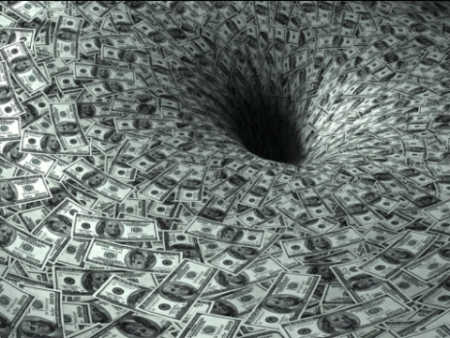
[Click to enlarge]
|
|
|
Nikola Tesla, for one, had little time for such arrogance:
Today's scientists have substituted mathematics for experiments,
and they wander off through equation after equation, and
eventually build a structure which has no relation to reality.
Space, once thought to be a tenuous vacuum, of course, has been
found to be alive with plasma and electromagnetism, much as Tesla
had alluded. Moreover, the math behind the Kinetic Theory of
Ordinary Gases is simply not relevant for plasmas, sometimes
referred to as ionized gases.
The approach which Hannes Alfvén suggested must ignore
the elegant and simplistic ordinary gases theory as the
electromagnetic forces within a plasma dominate.
- Wal Thornhill.
Alfvén went further:
“Such theories are developed
with the most sophisticated mathematical methods and it is only
the plasma itself which does not 'understand' how beautiful the
theories are and absolutely refuses to obey them!”
Are mathematicians afraid that electromagnetism would mess up
all their elegant equations because it is so difficult to model
mathematically? It's a shame when you consider that taking into
account plasma and its electrodynamic behaviors would obviate
the necessity for the current heavy reliance on exotic hypotheticals.
It is an embarrassment that the dominant forms of matter in the
universe remain hypothetical.
- Jim Peebles, Princeton University.
Of course, no sane person would deny the importance of mathematics.
I agree with Lord Kelvin when he said
“I often say that when you can
measure what you are speaking about, and express it in numbers,
you know something about it; but when you cannot measure it, when
you cannot express it in numbers, your knowledge is of a meagre
and unsatisfactory kind.”
However, for the sake of clarity, I say again: Math should be the
servant of science, not the queen. It really comes down to a
question of priorities. But don't take my word for it.
Science is mathematical not because we understand so much about
the physical world, but because we understand so little.
- Bertrand Russell.
Another problem with the mathematical approach relates to the
inability of mathematicians to agree on technical definitions.
There are, in fact, numerous ambiguous definitions for 'lines'
and 'points', and both of these concepts are critical to the
math behind so much modern cosmology, particularly black holes.
Bill Gaede does an excellent job exposing this fatal flaw in
"What's
the point."
The Credit Crunch
The current worldwide economic crisis is often referred to as
the credit crunch, and it cannot be denied that increasingly esoteric
financial dealings contributed to this situation. Currency was once
backed by real assets, principally gold. Likewise, science was once
based on empiricism - measurement and evidence.
Money can now be printed at the whim of powerful international
financiers, much as ad hoc hypotheticals are contrived to balance
scientific equations at the whim of influential scientists.
The following quotes from Rolling Stone magazine, in an
article
by Matt Taibbi, neatly sum-up the situation that led to recent
financial meltdown:
The mess Cassano created had its roots in an investment boom fueled in
part by a relatively new type of financial instrument called a
collateralized-debt obligation. A CDO is like a box full of diced-up
assets. They can be anything: mortgages, corporate loans, aircraft
loans, credit-card loans, even other CDOs. So as X mortgage holder
pays his bill, and Y corporate debtor pays his bill, and Z credit-card
debtor pays his bill, money flows into the box.
[..]
The problem was, none of this was based on reality. “The banks
knew they were selling crap,” says a London-based trader from one of the
bailed-out companies. To get AAA ratings, the CDOs relied not on their
actual underlying assets but on crazy mathematical formulas that the
banks cooked up to make the investments look safer than they really
were. “They had some back room somewhere where a bunch of Indian guys
who'd been doing nothing but math for God knows how many years would
come up with some kind of model saying that this or that combination
of debtors would only default once every 10,000 years,” says one young
trader who sold CDOs for a major investment bank. “It was nuts.”
While it is widely acknowledged that the financial markets are in
crisis, few people are aware that cosmology has hit similar dire
straits. It is not easy to hide facts from business people and the
public, especially when they are hit in the pocket, but the high
priests of science still hide ensconced in their ivory towers, safe
in the knowledge that most people are unaware of their costly
devotion to redundant ideology.
|
|
|
Permalink to this article.
Public comment may be made on this article on the
Thunderbolts Forum/Thunderblogs (free membership required).
For further investigations of these themes The Soupdragon recommends:
Plasma Cosmology.net
|
|
|
|
|
|
|





